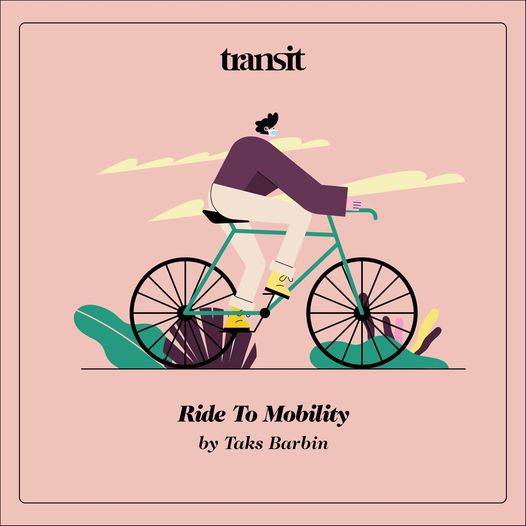Taks Barbin
The article was originally published at Transit Dialog
I have been biking since I was a child. I always associated the feeling of riding bikes with freedom, with flying. My friends and I can go to places where it would take us hours and a lot of walking energy to reach.
Even the renegade writer from Indonesia, 𝗣𝗿𝗮𝗺𝗼𝗲𝗱𝘆𝗮 𝗔𝗻𝗮𝘁𝗮 𝗧𝗼𝗲𝗿, once described bicycles as humanity’s best invention. We could cover distances with only pedal power as fuel, and with no smoke.
When the pandemic happened, it highlighted a number of inequalities. When public transport was banned, bikes became the reliable companion of anyone who can’t afford to buy a car or motorcycle. Suddenly, bikes became a necessity. In the country’s capital Metro Manila where only 12% of the population, owns a car, bicycles became the lifeline of many workers.
Bicycle prices sky-rocketed after a few months. It was horrible how profit-minded people took advantage of many buyers. The bike my brother gave me used to cost around P8,500, but now it’s around P15,000. Yet, bikes still are the most affordable and efficient mode of transportation. You can still buy a used bike for a good price.
But bike prices are not the only issue concerning bike-commuters. Safety for bikers hasn’t yet been thought of by many road users and lawmakers. Car drivers still open their doors without looking on their left first. Jeepney and taxi drivers still cut bikers to make sudden stops. Bikers still need to ride alongside 16-wheeler trucks if they want to make it on time for work. And most of them wonder if there really is such a law as the Clean Air Act.

I can’t help compare these scenarios with those from developed cities abroad where commuter safety is the number one priority. They take care of their constituents to a point where even if you forgot your helmet or even if you’re only using a cheap bike, you’re still safe and won’t have to die.
Slowly, local governments recognize the need for bike facilities. They recognize that many of their constituents are indeed bike-commuters. But still, most bike lanes are not connected to each other. Some are not even safe for biking because of road conditions, or because bikers still share the lanes with awaiting pedestrians and motorists who think their time is more important than the lives of some bikers.
Moreover, many establishments are still without safely guarded parking spaces. Bikes continue to be prone to stealing, making one think twice before using a bike.
It’s a good thing though that some groups pressure the governments to do their jobs. A group in QC made bike lanes by putting colored containers on the side of the roads, sparking a little friction with the Metro Manila Development Authority.
Others gave away reflectors and bike helmets. MNL Moves conducted mappings of bike paths across cities. And in November 2020, the Institute for Climate and Sustainable Cities along with 350.org and MNL Moves launched the Mobility Awards. It recognized the efforts of governments, establishments, and workplaces for being biker-friendly.
As a biker, I volunteered in this effort. As I promoted the awards in many biking groups, I witnessed how some bikers are bitter with their local governments. Someone even said online that there shouldn’t be awards like this because local governments don’t deserve them. I was quick enough to explain that it was more of an encouragement, a sort of positive reinforcement.
More campaigns for bike-commuting were eventually initiated. After the awards, a campaign for safe biking for women was launched. It turns out, biking infrastructures were not the only issue. Many women hesitate to bike because cases of cat-calling and unwanted touching are still prevalent.
Some men claim that women are harassed because of what they wear. But if we think of it, even in places where women cover their bodies up to their eyes, harassment and rape still happen.
These issues we face in biking communities reveal the symptoms of bigger problems. Harassments will continue as long sexism persists. Who does the government really serve, the majority of the people or the fewer elite who own multiple cars? And why do people need to steal bikes in order to survive in the first place?
Surely, these problems can’t be solved by blaming drug users, oppositions, or by establishing ceiling prices. Pointing out the existence of bike-communities may be a good first step. Besides, we deserve to be safe. Not only because we pay taxes, but because we are human beings. If we can’t bike in the cities, it means that the cities are not safe.
Recently, I gave my 20-year-old bike to my young nephews after using it for almost ten years. I did it hoping that my nephews would find the freedom I once discovered in riding bikes. And I also hope it would inspire them to fight for freedom, in all its forms.
These bike-commuting problems will persist if governments and people continue to lack sympathy. Yet we best not wait for that. Developments in bike-commuting will surely take longer if we wait for non-biking politicians to act for us.
There is strength in numbers, and biking communities already have that. Just remember not to ride too close to the gutters. Make sure you are noticed, or those four-wheelers will cut in and ignore you as fast as they could.
𝘛𝘢𝘬𝘴 𝘉𝘢𝘳𝘣𝘪𝘯 𝘪𝘴 𝘢 𝘸𝘳𝘪𝘵𝘦𝘳, 𝘱𝘦𝘳𝘧𝘰𝘳𝘮𝘦𝘳, 𝘢 𝘸𝘰𝘳𝘬𝘴𝘩𝘰𝘱-𝘧𝘢𝘤𝘪𝘭𝘪𝘵𝘢𝘵𝘰𝘳, 𝘢𝘯 𝘢𝘴𝘱𝘪𝘳𝘪𝘯𝘨 𝘢𝘯𝘢𝘳𝘤𝘩𝘪𝘴𝘵, 𝘢𝘯𝘥 𝘢𝘯 𝘢𝘥𝘷𝘰𝘤𝘢𝘵𝘦 𝘧𝘰𝘳 𝘦𝘯𝘷𝘪𝘳𝘰𝘯𝘮𝘦𝘯𝘵𝘢𝘭 𝘢𝘯𝘥 𝘤𝘶𝘭𝘵𝘶𝘳𝘢𝘭 𝘳𝘪𝘨𝘩𝘵𝘴. 𝘏𝘦 𝘱𝘭𝘢𝘺𝘴 𝘪𝘯𝘥𝘪𝘨𝘦𝘯𝘰𝘶𝘴 𝘮𝘶𝘴𝘪𝘤𝘢𝘭 𝘪𝘯𝘴𝘵𝘳𝘶𝘮𝘦𝘯𝘵𝘴 𝘢𝘵𝘒𝘰𝘯𝘵𝘳𝘢𝘨𝘢𝘱𝘪, 𝘢𝘯𝘥 𝘪𝘴 𝘢 𝘷𝘰𝘭𝘶𝘯𝘵𝘦𝘦𝘳 𝘢𝘵 350.𝘰𝘳𝘨. 𝘏𝘦 𝘢𝘭𝘴𝘰 𝘳𝘶𝘯𝘴 𝘢𝘯 𝘪𝘯𝘧𝘰𝘴𝘩𝘰𝘱 𝘤𝘢𝘭𝘭𝘦𝘥 𝘚𝘢𝘧𝘦𝘩𝘰𝘶𝘴𝘦 𝘐𝘯𝘧𝘰𝘴𝘩𝘰𝘱. 𝘏𝘦 𝘳𝘦𝘤𝘦𝘯𝘵𝘭𝘺 𝘦𝘴𝘵𝘢𝘣𝘭𝘪𝘴𝘩𝘦𝘥 𝘢 𝘵𝘶𝘵𝘰𝘳𝘪𝘢𝘭 𝘤𝘦𝘯𝘵𝘦𝘳 𝘧𝘰𝘳 𝘭𝘦𝘢𝘳𝘯𝘦𝘳𝘴 𝘰𝘧 𝘵𝘩𝘦 𝘍𝘪𝘭𝘪𝘱𝘪𝘯𝘰 𝘭𝘢𝘯𝘨𝘶𝘢𝘨𝘦 𝘤𝘢𝘭𝘭𝘦𝘥 𝘛𝘦𝘢𝘤𝘩 𝘔𝘦 𝘕𝘰𝘸 𝘛𝘢𝘨𝘢𝘭𝘰𝘨.
